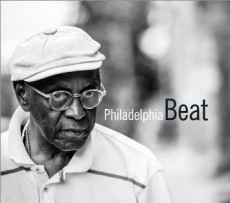
Daily Dose Of Jazz…
Albert “Tootie” Heath was born May 31, 1935 in Philadelphia, Pennsylvania the brother of tenor saxophonist Jimmy and bassist Percy. He first recorded in 1957 with John Coltrane but the following year started his career as a consummate sideman and for a decade an a half he performed and recorded with J. J. Johnson, Wes Montgomery, Art Farmer, Benny Golson, Cedar Walton, Bobby Timmons, Kenny Drew, Sonny Rollins, Dexter Gordon, Johnny Griffin, Herbie Hancock, Friedrich Guida, Nina Simone, Johnny Lytle, Milt Jackson, Clifford Jordan, The Young Lions and Yusef Lateef among numerous others.
In 1975, he, Jimmy and Percy formed the Heath Brothers and remained with the group until 1978, then left to freelance. Amongst his many workshop and classroom teaching assignments, Tootie Heath is a regular instructor at the Stanford Jazz Workshop.
Tootie Heath is now the producer and leader of The Whole Drum Truth, a jazz drum ensemble featuring Ben Riley, Ed Thigpen, Jackie Williams, Billy Hart, Charlie Persip, Leroy Williams and Louis Hayes. Hard bop drummer Tootie Heath has a small catalogue of four albums as a leader and more than five dozen as a sideman. He continues to perform, tour and record.
More Posts: drums
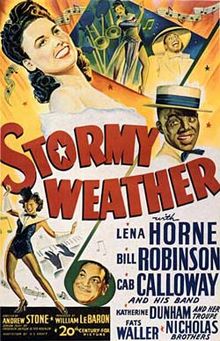
Hollywood On 52nd Street
Stormy Weather is both title track composed by Harold Arlen in 1933 and title of the 1943 film starring Lena Horne, Bill “Bojangles” Robinson and Cab Calloway, Katherine Dunham, Fats Waller, Ada Brown, Dooley Wilson and the Nicholas Brothers, Fayard and Harold. The romantic role of Selina, was invented for the film as Robinson did not have such a romance in real life. The song has been performed by Ella Fitzgerald, Etta James, Frank Sinatra, Red Garland, Charles Mingus, Don Byas to name a few. But the classic Horne is what you’ll hear.
The Story: The film is based upon the life and times of its star, dancer Bill “Bojangles” Robinson who plays Bill Williamson, a talented born dancer who returns home in 1918 after fighting in World War I and attempts to pursue a career as a performer. With his perpetually broke friend Gabe Tucker (Dooley Wilson along the way, he meets a beautiful singer named Selina Rogers (Lena Horne) at a soldiers’ ball and promises to come back to her when he “gets to be somebody.” Years go by, and Bill and Selina’s rising careers intersect only briefly, since Selina is unwilling to settle down.
Sponsored By
www.whatissuitetabu.com
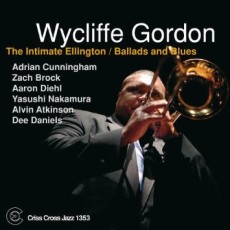
Daily Dose Of Jazz…
Wycliffe Gordon was born May 29, 1967 in Waynesboro, Georgia and was heavily influenced musically by the church music his organist father played at several churches in Burke County as well as being a classical pianist and teacher.
It wasn’t until 1980 that Gordon became particularly inspired in jazz at age thirteen, listening to jazz recordings inherited from his great aunt. The collection included a five-LP jazz anthology produced by Sony-Columbia and was drawn in particular to Louis Armstrong and the Hot Fives and Hot Sevens.
Wycliffe attended, at that age, Sego High School in Augusta, Georgia and played in the band under direction from Don Milford. He graduated from Butler High in 1985, performed in New York City as part of the McDonald High School All-American Band, went on to study music at Florida A&M where he played in the marching band.
His early works as a professional were with Wynton Marsalis but in recent years he expanded beyond swing and experimented with new instruments, notably the indigenous Australian wind instrument, didgeridoo. In 1995, Gordon arranged and orchestrated the third version of the theme song for NPR’s All Things Considered, the widely recognized melody composed in 1971 by Donald Joseph Voegeli.
In 2006 he founded Blues Back Records, his was an independent jazz label and released his Rhythm On My Mind album, a collaboration with bassist Jay Leonhart. His desire for full artistic control was the impetus for creating Blues Back. Blues Back had produced other artists in Wycliffe’s universe who met Gordon’s criteria for originality, however, since 2011 has been inactive.
Jazz trombonist, arranger, composer, bandleader and music educator at the collegiate-conservatory level, Wycliffe Gordon also plays didgeridoo, trumpet, tuba, piano, and sings. To date he has a catalogue of 19 albums as a leader and another eight as a sideman performing with John Allred, Marcus Roberts, Randy Sandke, Maurice Hines, Ron Westray, and Chip White. He continues to perform, tour, record and educate.
;
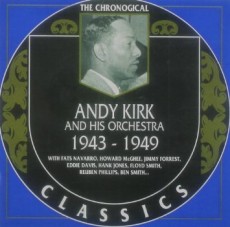
Daily Dose Of Jazz…
Andrew Dewey Kirk was born on May 28, 1898 in Newport, Kentucky but grew up in Denver, Colorado and was tutored by Paul Whiteman’s father, Wilberforce. He started his musical career playing with George Morrison’s band, but then went on to join Terence Holder’s Dark Clouds of Joy. In 1929 he was elected leader after Holder departed, renamed the band Clouds of Joy and also relocated the band from Dallas, Texas, to Kansas City, Kansas.
Also known as the Twelve Clouds of Joy for the number of musicians, they set up in the Pla-Mor Ballroom on the junction of 32nd and Main. They made their first recording for Brunswick Records that same year. Mary Lou Williams came in as a last moment pianist and so impressed the label’s Dave Kapp that she became a regular member and arranger of the band.
With the move they grew highly popular as they epitomized the Kansas City jazz sound and in mid-1936 Andy signed with Decca and made scores of popular records for the next decade. In 1938, he and band held the top spot of the Billboard chart for 12 weeks with “I Won’t Tell a Soul (I Love You)”, written by Hughie Charles and Ross Parker and featured Pha Terrell on vocals. In 1942 leading His Clouds of Joy, they recorded “Take It and Git”, which on October 24, 1942, became the first single to hit number one on the Harlem Hit Parade, the predecessor to the Billboard R&B chart. In 1943, with June Richmond on vocals, he had a number 4 hit with “Hey Lawdy Mama”.
Over time the band had Buddy Tate, Claude Williams, John Williams, bill coleman, Don Byas, Shorty Baker, Howard McGhee, Jimmy Forrest, Fats Navarro, Charlie Parker, Ben Thigpen,, Hank Jones, Joe Williams and Reuben Phillips among others.
In 1948, Kirk disbanded the Clouds of Joy and continued to work as a musician, but eventually switched to hotel management and real estate, but kept his hand in music serving as an official in the Musicians’ Union.[
Although the leader of the band, saxophonist and tubist Andy Kirk seldom was a soloist, utilizing the talent in his band for the spotlight. His genius lay in realizing how best to make use of his band members’ skills. On December 11, 1992 at the age of 94, he passed away in New York City.
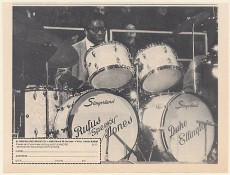
Daily Dose Of Jazz…
Rufus “Speedy” Jones was born May 27, 1936 in Charleston, South Carolina. Starting out on trumpet he switched to drums at the age of 13. He got an early start in 1954 with Lionel Hampton before being drafted. While stationed at Fort Jackson, Rufus played in a quintet every Saturday night at the black United Service Organization clubhouse in Columbia.
From 1959 to 1963 Rufus played with Henry “Red” Allen and Maynard Ferguson’s Orchestra. He led his own quintet during 1963-1964 producing a Cameo LP, his only album as a leader. He gained fame for his flamboyant work with Count Basie in the mid-1960s and backed that up with Duke Ellington in the latter half of the decade. He also notably appeared with James Brown. On April 25, 1990 drummer Rufus “Speedy” Jones passed away in Las Vegas, Nevada.
More Posts: drums



